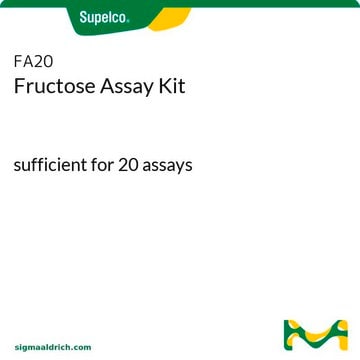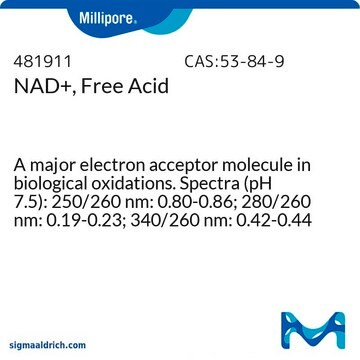MAK442
Sorbitol Assay Kit
Sufficient for 100 colorimetric tests
Synonym(s):
D-Sorbitol Assay Kit
Sign Into View Organizational & Contract Pricing
All Photos(1)
About This Item
UNSPSC Code:
12161503
NACRES:
NA.84
Recommended Products
Quality Level
input
biological sample(s)
food(s)
plant sample(s)
application(s)
agriculture
cosmetics
environmental
food and beverages
detection method
colorimetric
relevant disease(s)
diabetes
storage temp.
−20°C
General description
Sorbitol, also known as glucitol, is a sugar alcohol metabolized slowly within the human body. It is derived from glucose through the reduction of an aldehyde group to a hydroxyl group. Excessive accumulation of sorbitol in erythrocytes, retinal cells, and Schwann cells has been linked to various health issues including retinopathy, cataracts, peripheral neuropathy, and diabetes. Sorbitol is primarily sourced from corn syrup and naturally occurs in fruits such as apples, pears, peaches, and prunes. Widely utilized as a sugar substitute and laxative, sorbitol also finds applications in specialty culture media, as well as in healthcare, food, and cosmetic products. Monitoring sorbitol levels in biological samples aids in understanding metabolic pathways and tracking the progression of diabetes.
Application
The Sorbitol Assay Kit may be used for:
- Metabolism Research
- Food and Beverage Analysis
- Diabetes Research
Features and Benefits
- Fast and Precise Measurement: Achieve results in less than 1 hour, providing rapid analysis with a detection range of 5 - 1000 μM D-sorbitol ensures accurate measurements across a wide range of concentrations.
- High-Throughput Compatibility: Effortlessly integrate our kit into high-throughput handling systems, optimizing efficiency and ensuring accurate results.
Suitability
The kit is suitable for the quantitative determination of D-sorbitol and evaluation of drug effects on sorbitol metabolism in biological (e.g. blood), food, beverage and agriculture samples.
Principle
The sorbitol assay involves an end-point enzyme coupled MTT/NAD reaction that forms a colored product with an absorption maximum at A565 nm. The increase in absorbance at A565 nm is directly proportional to the sorbitol concentration.
Other Notes
For additional information on our range of Biochemicals, please complete this form.
Storage Class Code
12 - Non Combustible Liquids
Choose from one of the most recent versions:
Certificates of Analysis (COA)
Lot/Batch Number
Don't see the Right Version?
If you require a particular version, you can look up a specific certificate by the Lot or Batch number.
Already Own This Product?
Find documentation for the products that you have recently purchased in the Document Library.
Our team of scientists has experience in all areas of research including Life Science, Material Science, Chemical Synthesis, Chromatography, Analytical and many others.
Contact Technical Service





